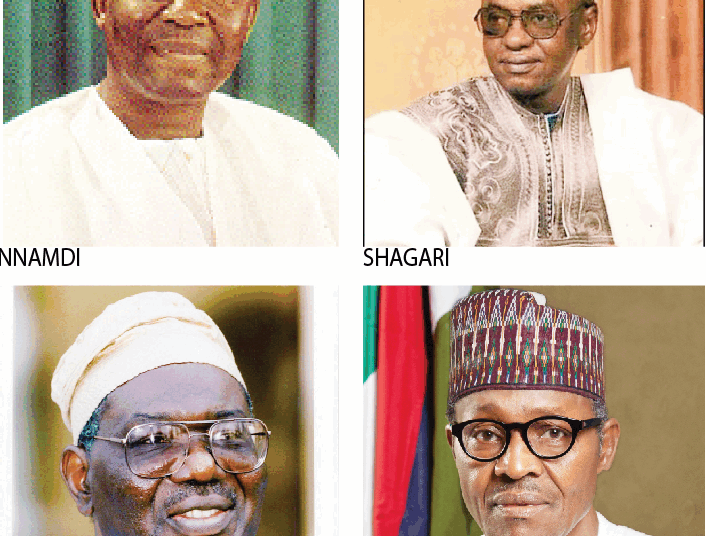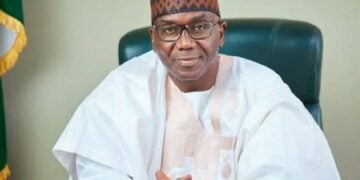At least four Nigerian presidents have died after leaving the highest political office in the country. They include Nigeria’s first President, Dr. Nnamdi Azikiwe, the country’s Second Republic President, Alhaji Shehu Shagari, Interim National Government head Chief Ernest Shonekan, and most recently, former President Muhammadu Buhari.
These leaders lived beyond their time in office, leaving behind complex legacies that continue to shape Nigeria’s political narrative.
On the other hand, several Nigerian leaders died while still serving the nation. These include Sir Abubakar Tafawa Balewa, Nigeria’s first and only Prime Minister, who was killed during the 1966 coup; Major General Johnson Aguiyi-Ironsi, who was also assassinated that same year; General Murtala Muhammed, killed in a failed coup in 1976; General Sani Abacha, who died suddenly in office in 1998; and President Umaru Musa Yar’Adua, who passed away in 2010 after a prolonged illness while in office.
These two categories of departed leaders, those who died in office and those who passed after their tenure, reflect the country’s turbulent political history and the weight of leadership at Nigeria’s highest level.
Fortunately, several Nigerian presidents, both civilian and military, who once held the nation’s highest office are still alive today, including the incumbent, President Bola Ahmed Tinubu.
Among the living former leaders are General Yakubu Gowon, General Ibrahim Babangida, General Abdulsalami Abubakar, Chief Olusegun Obasanjo, and Dr. Goodluck Jonathan, all of whom played significant roles in shaping Nigeria’s political and democratic journey.
The Former Presidents Who Died Out Of Office
NNAMDI AZIKIWE
Born on November 16, 1904, Dr. Nnamdi Azikiwe, fondly known as “Zik of Africa,” was a prominent Nigerian statesman and nationalist who played a key role in the country’s independence. He served as Nigeria’s first President from 1963 to 1966, after becoming Governor-General in 1960 alongside Prime Minister Abubakar Tafawa Balewa.
Azikiwe died at the age of 91 on May 11, 1996, at the University of Nigeria Teaching Hospital, Enugu, after a prolonged illness.
Beyond his presidency, Dr. Azikiwe was a pioneering journalist, intellectual, and one of the founding fathers of modern Nigerian nationalism. He was instrumental in establishing several newspapers that advocated for independence and Pan-Africanism. A staunch believer in education, he helped lay the foundation for higher learning in Nigeria and played a major role in the founding of the University of Nigeria, Nsukka, where he later served as Chancellor. His influence extended beyond politics, earning him widespread respect across Africa as a symbol of unity and progress.
SHEHU SHAGARI
Alhaji Shehu Usman Aliyu Shagari, Nigeria’s first executive president, died on December 28, 2018, at the National Hospital in Abuja at the age of 93. He served as President from 1979 to 1983 under the banner of the National Party of Nigeria (NPN), until his government was overthrown in a military coup on December 31, 1983, led by Major General Muhammadu Buhari, who himself passed away recently.
Shagari began his political journey in 1951 as the secretary of the Northern People’s Congress (NPC) in Sokoto. Over the years, he held several key positions in Nigeria’s First Republic. In 1958, he was appointed Parliamentary Secretary and later became the Federal Minister of Commerce and Industries. Between 1959 and 1960, he served as Federal Minister of Economic Development, and from 1960 to 1962, he was reassigned as Federal Minister of Pensions. He went on to serve as Federal Minister of Internal Affairs from 1962 to 1965, and just before the first military coup in January 1966, he was Federal Minister of Works.
Shagari was widely respected for his simplicity, humility, and deep commitment to public service. His tenure as president was marked by efforts to promote national unity and economic development, even as the country faced growing economic and political challenges.
ERNEST SHONEKAN
Chief Ernest Shonekan passed away on January 11, 2022, at the age of 85, due to complications from pneumonia in a Lagos hospital. He is remembered for his brief but significant role as the head of Nigeria’s Interim National Government in 1993, a transitional administration that lasted only a few months before he was ousted in a palace coup by General Sani Abacha.
Before entering the political arena, Shonekan had an illustrious career in the private sector. He was the chairman and chief executive officer of the United African Company of Nigeria (UACN), a leading Nigerian conglomerate and the successor to The Niger Company. Under his leadership, UACN was one of the largest African-controlled companies in Sub-Saharan Africa, with diverse interests in manufacturing, agriculture, and services. Shonekan’s expertise as a lawyer and businessman was widely respected, and his appointment as interim head of state was seen as an attempt to stabilise Nigeria during a period of political uncertainty. Despite his short tenure, his leadership marked a crucial moment in Nigeria’s return to civilian rule.
MUHAMMADU BUHARI
General Muhammadu Buhari passed away on Sunday, July 13, 2025, in London at the age of 82. Born on December 17, 1942, in Daura, Katsina State, Buhari had a long and distinguished career in both military and civilian leadership. He served as Military Governor of the old Borno and North Central states between 1975 and 1976, demonstrating early administrative skills that would shape his later political journey.
As a retired army general, Buhari also held the position of Federal Commissioner for Petroleum Resources during the military regime of former Head of State, Olusegun Obasanjo , from 1976 to 1979, overseeing Nigeria’s critical oil sector. His rise to national prominence peaked in December 1983 when he led a successful military coup that overthrew the civilian government of President Shehu Shagari. Buhari then ruled as Head of State until August 1985, with Major General Tunde Idiagbon serving as his Chief of General Staff.
His administration was known for its strict anti-corruption stance and efforts to discipline the civil service, although it faced criticism for human rights abuses and economic challenges. Buhari’s government was eventually toppled by another military coup led by General Ibrahim Babangida.
After years away from political power, Buhari re-emerged as a democratic leader, winning the presidential election in 2015 under the platform of the All Progressives Congress (APC). He was re-elected in 2019, marking a historic transition as the first former military ruler to be elected twice in a civilian capacity.
His presidency focused heavily on anti-corruption, security challenges such as insurgency and banditry, and economic reforms. Buhari completed his second term in 2023, handing over power peacefully to President Bola Ahmed Tinubu.
Throughout his life, Buhari remained a significant figure in Nigeria’s political landscape respected by some for his discipline and resolve, and criticised by others for perceived authoritarian tendencies. His death marked the end of an era spanning Nigeria’s military and democratic histories.
The passing of these former presidents marks the closing chapters of lives deeply woven into Nigeria’s political fabric. From military rule to democratic transitions, their legacies, marked by triumphs, controversies, and defining national moments, continue to shape the nation’s collective memory. As the country moves forward, their stories serve as a reminder of the enduring impact of leadership, service, and the ever-evolving journey of the Nigerian state.
We’ve got the edge. Get real-time reports, breaking scoops, and exclusive angles delivered straight to your phone. Don’t settle for stale news. Join LEADERSHIP NEWS on WhatsApp for 24/7 updates →
Join Our WhatsApp Channel










